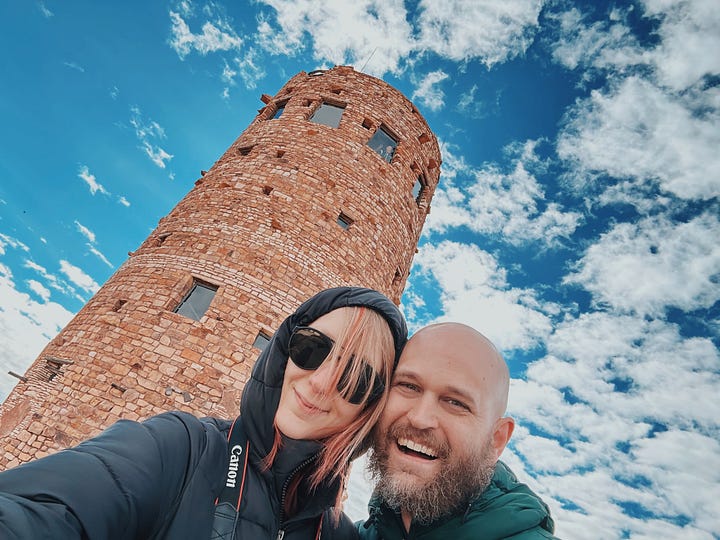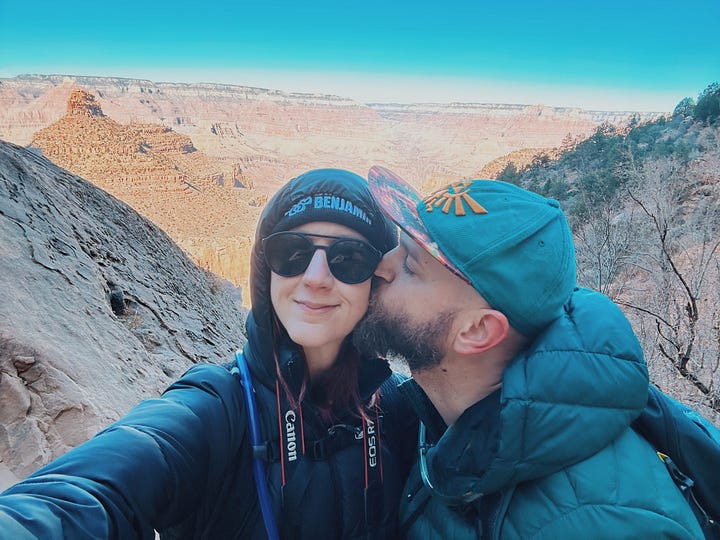(Content note: this post contains frank references to self-harm, eating disorders, and suicidality)
Glass glinted in the parking lot’s gravel, shards of broken bottles winking like austere, unfriendly eyes. I walked barefoot over the hard edges in the dark. I did not flinch.
It was 40 degrees outside in a damp Texas December. I was 16 years old, and I had snuck out of the house. I did this increasingly often — but not out of mischief. It was out of inward-turned malevolence. I felt I deserved every bitter edge beneath my feet.
Later that night, after walking for hours without shoes or a coat in the cold, I wrote in my journal: “The cold made my whole body ache, and made me feel sicker than ever. I kept walking.”
My penance punished a two-fold sin: the first was that I’d eaten a fairly normal-sized meal for dinner due to social pressure, which sent my eating-disordered cognitions into a frenzy. But the greater sin, even more egregious than eating, was this: I was in love. And no matter how much I starved, cut, or exhausted myself, I could not bloodlet the love from my fearful heart.
A lot has been written about purity culture, about how it helped and how it harmed, how good intentions became trauma for far too many people. I am not here to rehash any ideology — only to share what I lived.
And what I lived was one of the most profound wounds of my life.
I grew up in the courtship movement, where boys asked fathers to court their daughters and the wooing was intended to play out wholly in the family setting. I grew up being told that to have a crush on a boy was to give him a piece of your soul forever, that you would never get it back, that you’d deprive your future God-given spouse of something you owed them. I grew up not allowed to dance, not allowed to pray in front of males, not allowed to bare knees or shoulders or collar bones, not allowed to go without a veil in religious settings.
And I took all of it to heart. I wanted to be good. I wanted so, so desperately to be good.
So when Jordan came into my life like an enthusiastic, braces-wearing wrecking ball, it upended everything.
We were 15 when we started talking in an online writer’s group. One of my forum friends had a huge crush on Jordan, and I wanted to assess if he was a worthy object of her affection. So I used the same metric I used for everyone: I sent him a message, introducing myself in brief, then asking, “do you like Lord of the Rings?”
He said he did.
We’ve never stopped talking since.
Seven months later, his choir from Tennessee was passing through my area on tour. We started scheming ways for my local friend group, who was also on the forum, to meet up with him. I knew it was deeply unlikely. Miraculously, when his mom called my mom to make sure we were all real people and not ax murderers (the grand fear on the internet in 2007), they found they had a shared background of missionary work in Africa. They connected over the memories.
Our date to meet was set for February 19, 2007.
I’ve written the story of that night often, and some day will tell it at greater length when I expand this in my memoir. To recount it in brief: I was so nervous as we arrived at the camp where we’d be meeting him that I was frantically shaking. It was dark, the landscape draped in February gray. My friends and I saw him from a distance, clad in his then-signature uniform of khaki pants and a windbreaker.
He didn’t know I wasn’t allowed to hug boys. I don’t think he would have cared if he did know. He bounded over, giving each one of us a hug in turn.
We started walking down to a fire pit to join his choir for songs and s’mores by a lake. In rural Texas, the moonlight and starlight were bright enough to see by — just barely. We stumbled along the path, chatting easily.
My friends would later tell me it was the first time they’d seen me smile in a year. I had fresh self-harm wounds hidden under my t-shirt sleeves. I was pale and tired from lack of food.
Jordan knew all of this about me. I had warned him that my friends had all come to understand: Mary “hides in the shadows” for most of social gatherings. It’s just how she is. Mercifully, they were the kind of friends who let me show up anyway.
But that night, walking with Jordan, I was in the middle of the group. I said more sentences in a row during those first 15 minutes than I would usually say in hours. And after a little while, he looked over at me and flashed what I’d come to know as his trademark grin: braces bright in the moonlight, eyes crinkling into obscurity behind his joy.
“You’re not hiding in the shadows!” he said triumphantly.
“No,” I said slowly. “I guess I’m not.”
And in that moment, some deep knowing in me was aware of two things with utter certainty.
First: I had found possibly the only person on earth that I could ever fall in love with.
Second: I was in big, big trouble.
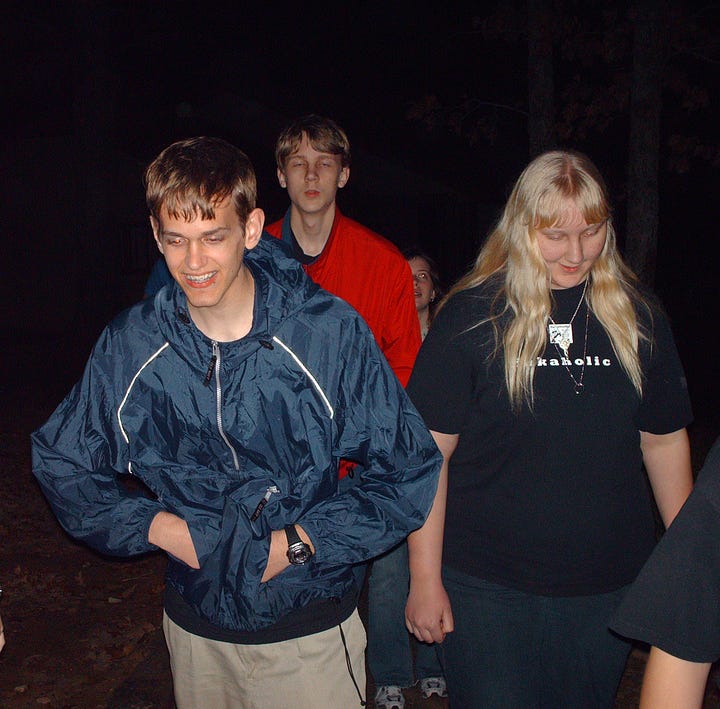
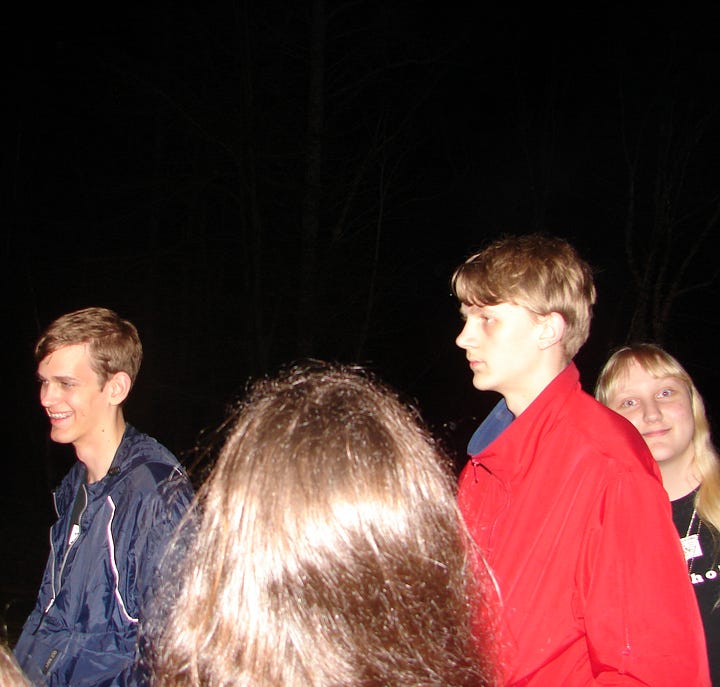
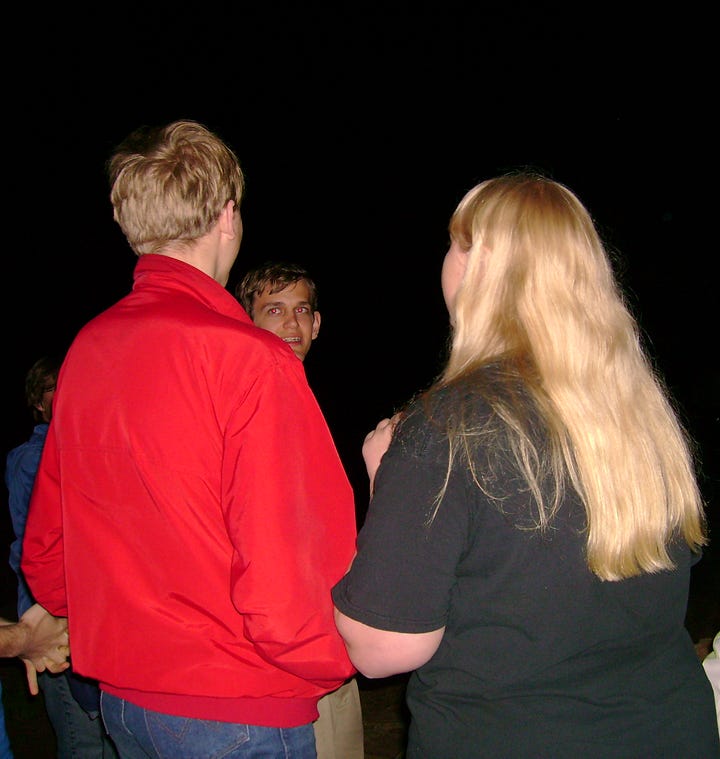
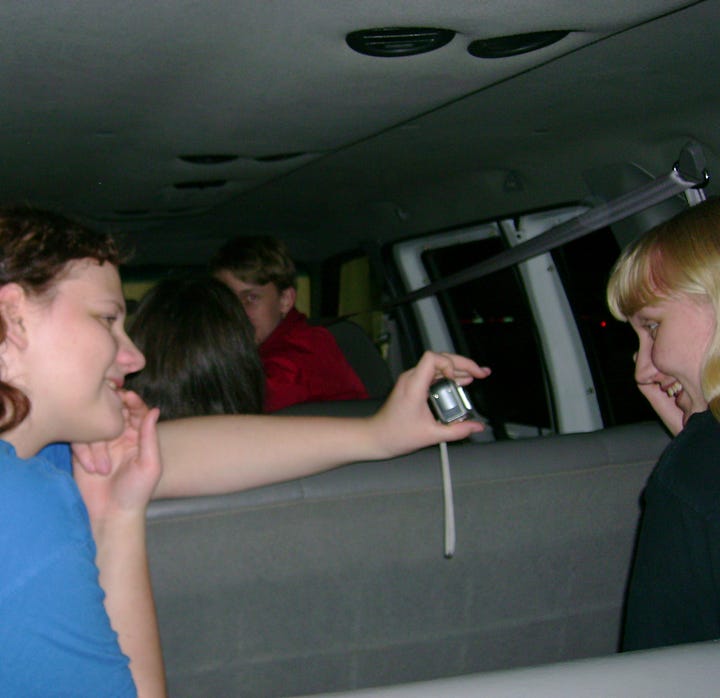
“I am constantly thinking wouldn’t it be great if I married him? And why do I get this weird, warm feeling when I talk to him, and why do I feel so elated?”
I wrote those words two months later, shortly before I turned 16.
“I hate this feeling. I don’t want to be interested in him… Why is it I always imagine him when I imagine my future husband?”
I had always believed that crushes were moral failings that I would forever be able to strong-arm my emotions out of. But here I was, humiliatingly happy to talk to him despite my best efforts to cleanse the emotions from my heart.
And people were starting to notice. That summer, I got in significant trouble for my deepening friendship with Jordan. I was told that I was “just like every other boy-crazy American girl,” chasing and trying to seduce him.
I felt a paralyzing anguish of shame. I was trying so hard not to do that, to keep our relationship a friendship, to stop feeling.
But clearly, it wasn’t enough. I was forbidden from using the forum where we chatted for half of the summer of 2007 (as were my two siblings who were on it with me).
So Jordan and I wrote letters. We had an Ascii art bunny we used to drop messages to each other like it was a shared pet. We called it Kyune. Jordan drew fanciful doodles in the margin of his letters to show me how Kyune was doing. He designed and printed out custom paper to write the letters on, covered in photos of leaves from his Tennessee backyard.
This was very shortly after I abandoned my suicide plans; he had been one of just two people who knew about that. He was steadying and kind.
And I was tormented.
I starved more and more, finding the low hum of deprivation to be one of the only ways to drown out how much I cared for Jordan and how sinful it made me feel. I would go through phases of acting cold, disinterested, borderline cruel, trying to make him mean so I’d have a reason to stop liking him. Notoriously, one day I started a massive argument by saying that I could never marry anyone who wasted time playing video games (his favorite hobby). But even then, he forgave me so quickly it only frustrated me more.
So the nighttime self-flagellating walks began.
On those long pilgrimages into loathing, I would beg God to take away my attachment to Jordan. I would implore Him to see my deep desire not to mar myself with romantic love.
Every time I held out shaking hands, begging to have my feelings taken from me, it was like Love gently closed my fingers back around them — told me to keep them. Told me to wait.
I was so confused. I have never in my life hated myself for anything as much as I hated myself for what I believed to be the sin of being in love.
And understand, it was possibly the most chaste crush known to humankind. I remember once or twice feeling curiosity about what it would be like to kiss, and immediately going on a days-long self-punishment bender to beat the thought out of my adolescent brain.
This whole time, I would not even write in my journal “I have a crush on Jordan” because I could not bear to face the enormity of that great hideousness. I talked about struggling with my feelings in vague terms. I writhed in the confines of language. And I told Jordan directly that I had no romantic feelings for him. I said it because I wanted it to be true, even though it wasn’t — and he accepted it because he trusted me implicitly.
Things went on like this for three painful years.
When I was 18, I went to see one of my favorite bands — Disciple — for the second time. The night would prove monumental, in several ways. But one of the ways was that between songs, the lead singer, Kevin, delivered a message about releasing things from our lives that were hurting us. He talked about allowing a loving, divine hand to surgically remove the cancer from our spirits.
In a blinding moment of soul-sick revelation, it hit me: the problem had never been my love for Jordan. The problem had been the toxic shame that led me to hurt myself. The problem had been the anguish that drove me to deceive my closest friend. That was what was damaging my life, my soul.
I thought about Kevin’s message for weeks. Finally, I told Jordan: we need to talk.
I snuck out of the house, again, because there was nowhere to be alone at home. I holed up in a darkened lobby on the campus of the college I attended. I logged onto Google Chat. And I told Jordan everything.
I told him I had harbored feelings for him for years. I told him I had not been honest, with myself or with him. I told him it had been one of the greatest shames of my life. I told him that I gave him full freedom to set boundaries with me, even to leave the friendship, given what he now knew. I told him I was so, so sorry.
I was crying so hard I could barely see the screen.
Then Jordan started typing.
He told me that if there was anything to forgive, he forgave me — but that he didn’t even care about that. All he cared about was how awful it must have been for me to suffer so much in secret, that he wanted to do anything in his power to lessen my pain. He said he wasn’t even thinking about dating or relationships — he was in his own strain of religious culture, with its own strictures. But he reiterated, as we so often told each other clearly, that that didn’t mean he didn’t love me. He told me that he would lay down his life for me without a second thought.
I knew he meant it.
I was fragile for months after that, unsure of where we stood. But when I saw him at our group’s annual retreat that summer, I knew we would be OK. I felt repair. I felt forgiven.
I just had to try to forgive myself.
Slowly, slowly, I released my obsession with trying to feel differently about him. I let myself be as I was. I focused on my burgeoning love for rock and roll, on my friendships, and on my rapidly impending senior year of college.
Then, a year after I’d had that fateful night of honesty with Jordan, he sent me a similar message: we need to talk.
He asked to call me on our (matching and very cool Motorola slide) phones. I was suspicious; we talked over the phone occasionally, but as diehard introverted millennials, it had never been our favorite. I picked up my phone as he called, pulling on my beloved green Switchfoot hoodie and rushing out to stand in my parents’ driveway for privacy.
He told me he had thought about what he wanted in a partner. He’d been mentally listing it out, finding that it all came to him naturally. And he realized why he knew what to look for: he had learned what kind of person he loved through loving and being loved by me. Growing up with me was his blueprint for what he wanted a partnership to look like.
And that was when he realized maybe he was in love too. Would I consider trying a different kind of relationship?
Five years into our friendship, I sank to the pavement in the dark. I lay flat on my back, looking up at the dim southern stars. I could hardly breathe.
My feelings had never been wrong. They’d just shown up a little early.
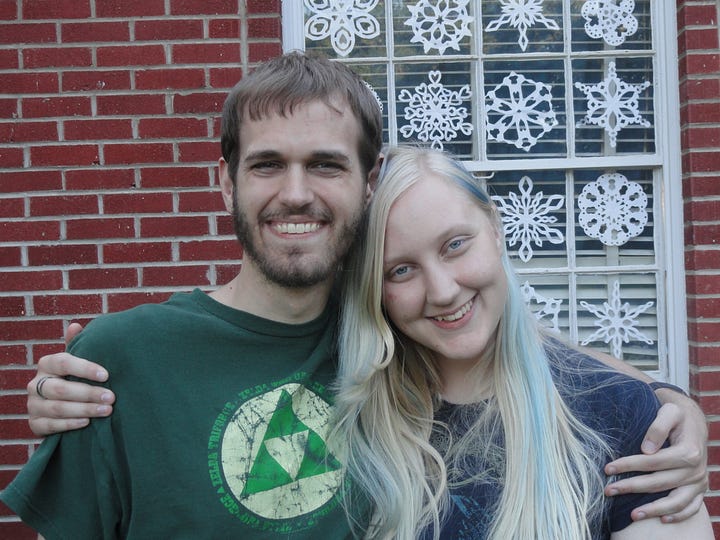
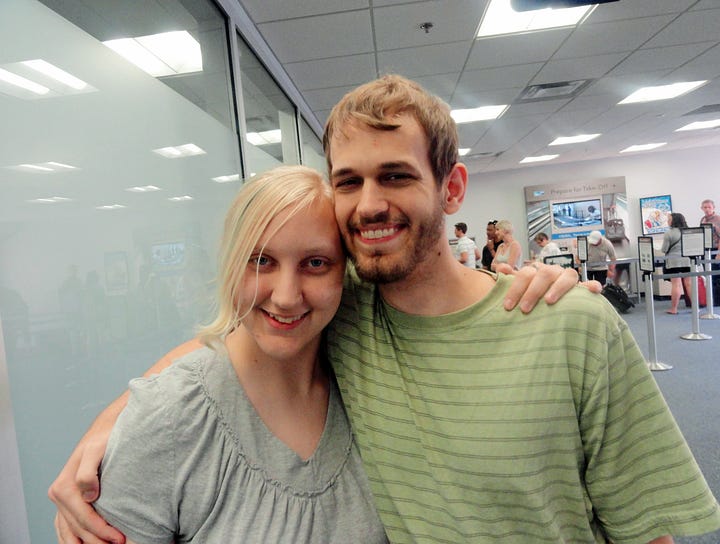
I could say “the rest is history,” but that is a deep over-simplification. I had lived in so much reflexive shame for loving him, for so long, that it continued to interfere — especially as I was still navigating both courtship culture and some other jealous relationships that could not stand seeing my heart bound fast to his.
One day during the last weeks of our engagement, I found every sharp object I could in the unfamiliar Nashville apartment I was staying in. I tested which edges could do the most damage to the body I hated. I could not stand the humiliation of loving and being loved. I felt so sinful and weak. I still felt like I deserved to die.
Sure, the rest is history. But history is still present in the way we have spent long, long stretches of our marriage where I couldn’t even stand to let him hug me, my shame is so strong. History shows up in the ways I still feel safer when I starve myself numb. History factored in the abuse that almost ruined me. History is why only last year — 11 years into our marriage — I finally felt OK letting him buy me flowers.
And still, despite it all: there is us.
Us in hospital rooms and coffee shops. Us in New Zealand and on our couch piled with cats. Us playing with our nieces and grieving his late mother. Us building blanket forts in our living room and working until far too late at night.
Jordan and Mary — somehow, impossibly, us.
I am so glad that when I begged God to take away my emotions for Jordan, He didn’t listen. I am so glad that I gently but firmly had my love handed back to me: “keep it. You’ll want this, later.”
And I am so glad that we continue to be the heartbreak each other chooses, over and over again, through each new version of ourselves that we become.
